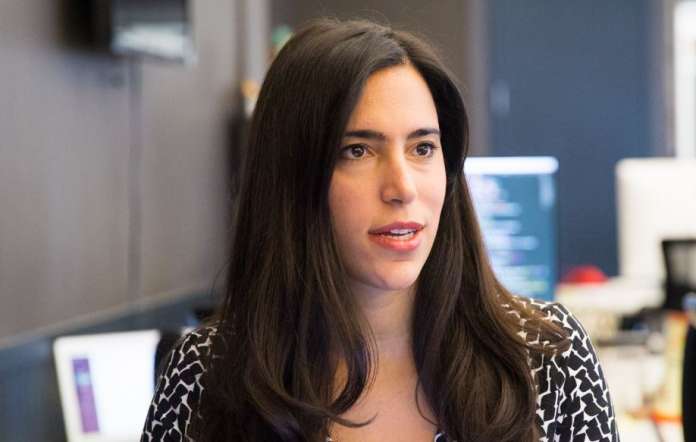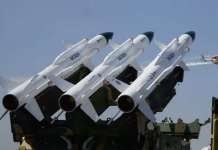Lara Setrakian is 33 and ready to change the news industry. Again.
Three years ago, she co-founded News Deeply, a media company centered on subject-based deep dives into major news stories.
The Syria-focused edition of her site emerged out of nowhere in December 2012 to become one of the go-to resources for information and context on the growing conflict. It followed that up with another site that focused on the Ebola outbreak in Africa. Then came the Arctic.
Now News Deeply has 11 staffers in four countries, $2.5 million in venture funding and ambitions to grow far bigger.
This week, Setrakian’s team tackles most ambitious project yet: Refugees Deeply, centered on the global impact of the refugee crisis that has swept through the Middle East and Europe.
For the past few months, Setrakian has been running it all while very, very pregnant.
She admits it was something that did force her to pause, at least at first. “Can I really pitch and can I really do a demo day with a big belly?” she recalls thinking.
Now, she says, “I’m tired of being afraid of it.”
“I’ve never been a better CEO than when I’ve been pregnant,” she says. “It has made me a lot stronger and a lot more capable to draw the line in certain places.”
When talking to Setrakian, it can be a little hard to believe she’s afraid of anything. She’s already a veteran reporter who has covered events like the Arab Spring and the Duke lacrosse sexual assault case.
At the moment, Setrakian has a lot of evidence on her side. Syria Deeply, always a niche effort, didn’t attract the kind of 1-million-view audiences that digital media editors usually brag about, but its 10,000 unique visitors per day for stories from executive summaries to infographic-packed pieces on women’s inclusion in the Geneva peace talks revealed a larger-than-expected audience.
Then, Setrakian hit the “pause” button. News Deeply was growing but it needed more: better technology, more scalable ways to grow, better systems in general.
I was in the right place, right time, wrong job when that bomb went off. I actually want to be explaining to people why this is happening.
Setrakian is a first-generation American whose parents emigrated to the U.S. from Armenia. Growing up in the New Jersey suburbs and attending a competitive New York City high school, she was the kind of ambitious kid who first dabbled in journalism by writing letters to CBS News to shadow one of their producers.
After four years at Harvard and an internship with ABC News, she followed the corporate route to McKinsey, where, as a young analyst, she traveled to Beirut on a business trip. There, everything changed.
One day, as Setrakian was sitting at a cafe on Beirut’s seaside, a bomb exploded nearby. It was the assassination of former Prime Minister Rafik Hariri, as his motorcade drove along the waterfront Corniche. It changed Setrakian’s way of seeing the world.
“I was in the right place, right time, wrong job when that bomb went off,” she says.”I figured this is a sign. I actually want to be explaining to people why this is happening.”
The bombing pushed Setrakian towards journalism.
Her first big story in front of the cameras came when she led the network’s coverage of the Duke lacrosse sexual assault case, in which an exotic dancer falsely accused the university’s lacrosse team of gang-rape.
Her bosses, impressed, gave Setrakian the Middle East correspondent job at the age of 25 in the role of the one-woman band — boosted by her language skills in English, Spanish, Arabic, Armenian, French and Portuguese.
It was a prestigious beat for the network — one that had been created in 1968 by the late Peter Jennings, who came to know the region’s leaders and earn the nickname “Peter of Arabia” in the 1970s. The Middle East beat was one of the training grounds for the network’s stars.
Still, it was anything but glamorous. At ABC in 2007, Setrakian had to rely only on herself.
She covered the region at a time of its greatest and most widespread upheavals since the fall of English and French colonialism redrew national borders in the 20th century: rising social unrest in Egypt and growing resistance to Hosni Mubarak, the Iranian presidential election in 2009, what seemed like an endless series of bombings, deposed leaders and sweeping historical changes.
Her reporting attracted the attention of Bloomberg, which struck a deal with ABC that would allow her to work for both companies.
The media’s inability to communicate became her challenge, the problem that she wanted solved.
“Most people who cover the Middle East could have told that Syria was the most important, the most consequential, the biggest ripple effect, the most mind blowing,” she says. “If you look logically at how we communicate, it’s a flaw to miss such a big signal.”
Setrakian had an idea about how to address that flaw. She left ABC and Bloomberg in 2012 at the age of 30 to found Syria Deeply.
As Syria fell apart, the factions that emerged were generally lumped together as “rebels,” against president Bashar Al-Assad, but what many Westerners did not see is that each group had very different motivations. To those who weren’t watching closely, it looked like chaos, a scrum of attacks and guns and tanks with no visible purpose. To Setrakian and those watching every day, the outlines of the conflict were forming into something more defined, scary, and global.
So News Deeply still has to answer a question: How do you make a sustainable business out of important but wonky news with a limited audience in the digital age?
One key is moving faster. News Deeply’s tech side needed help. So Setrakian looked west to Silicon Valley. News Deeply was accepted to the Matter media startup accelerator and began working on its own system to start and operate its sites.
“It will literally become a matter of minutes to launch a new subject,” she says. “And that unlocks a whole new world of possibilities.”












